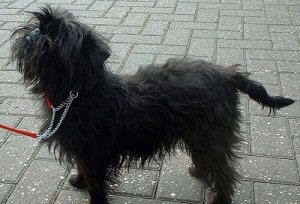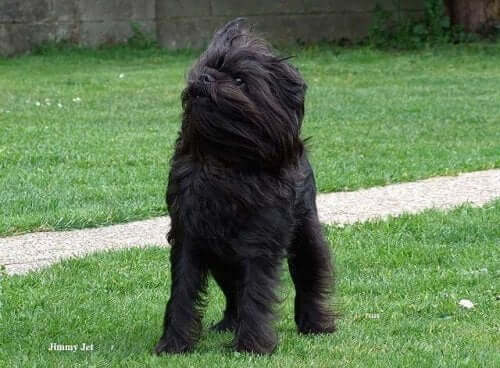All About the Affenpinscher Dog Breed

As its name implies, this small dog breed belongs to the Pinscher family and has distinctive black ruffly hair. The creation of the Affenpinscher breed goes back to Germany in the 16th century. They called these early specimens “monkeys” because of their appearance. In today’s article, we’ll tell you even more about this breed.
The history of the Affenpinscher
The Affenpinscher is a fairly old breed that appears in some of the paintings by Durero and Van Eyck from the 16th century. Its name has to do with its similarity to monkeys (the word affen means monkey in German). In fact, 150 years ago, people believed these canines were the result of cross-breeding between a primate and a Pinscher.
While this is, of course, untrue, experts aren’t really sure how the breed came into existence. It may have been born from breeding between a Miniature Schnauzer or Pinscher with a German Terrier (now extinct).
In Germany, its homeland, the Affenpinscher worked in the fields. These dogs have an instinct for trapping rodents, so they managed to hut all types of rodents in barns, kitchens, stables, and shops. Later, they became companion pets. Over time and as the result of supposed mixing with Asian breeds, the Affenpinscher became smaller and smaller. What’s more, its face became flatter.
More interesting details on the Affenpinscher
From the year 1896 and onward, this breed has been considered a separate breed from the miniature Pinscher. It nearly disappeared during World War II, like many other European breeds. After the war, it was bred with the Griffon Bruxellois in order to reduce the size of its snout. This also exaggerated the size of the dog’s face, with its unique beard, whiskers, and lion’s mane.
This particular breed is not very popular outside of Germany. Just the same, you can find a number of them in the United Kingdom.
As for their physical characteristics, the Affenpinscher has a round and furry head (their hair falls in front of their eyes). They have a short snout, furry cheeks, and their ears stand up and are separated from one another. It’s common for owners to dock their tail, which is positioned high up.
The lower jaw of these canines is prominent and they may have a bit of a jowl. They can measure up to 11 inches and weight up to 9 pounds as adults.

The behavior of the Affenpinscher
These German dogs are particularly affectionate, active, and intelligent. They adapt to any environment and space and are prone to staying up at night. They like to hunt small animals, like all Terriers, and may be someone shy around people they don’t know.
Affenpinschers make for exceptional pets. They are very loyal, curious by nature, and are great companions. They can be a bit bold when a situation really requires it, but never get bored because they always find some way to pass the time.
The health and care of the Affenpinscher
Taking these dogs to classes is fundamental when it comes to training and socializing them as puppies. Keep in mind that they can be somewhat stubborn and hard to teach. It’s important to take them out to parks and other places where they can spend time with other dogs, playing and burning off energy.
While it may not look like it, their hair requires specific care. Owners should brush them on a weekly basis to remove dirt and dead hair. During shedding season, they need to consume more vitamins.
It’s also important for owners to keep a close eye on their eyes, as the Affenpinscher is especially prone to infections. Washing them regularly with a saline solution will help with this issue.
Affenpinscher bitches that are pregnant may require C-section.
This unique dog breed isn’t the best choice for homes with small children. While they love mischief, they may also become a bit aggressive if they feel threatened or annoyed. However, they can make excellent pets in homes with teens or adults.
Source of images: Craig Pemberton and Belgazou
As its name implies, this small dog breed belongs to the Pinscher family and has distinctive black ruffly hair. The creation of the Affenpinscher breed goes back to Germany in the 16th century. They called these early specimens “monkeys” because of their appearance. In today’s article, we’ll tell you even more about this breed.
The history of the Affenpinscher
The Affenpinscher is a fairly old breed that appears in some of the paintings by Durero and Van Eyck from the 16th century. Its name has to do with its similarity to monkeys (the word affen means monkey in German). In fact, 150 years ago, people believed these canines were the result of cross-breeding between a primate and a Pinscher.
While this is, of course, untrue, experts aren’t really sure how the breed came into existence. It may have been born from breeding between a Miniature Schnauzer or Pinscher with a German Terrier (now extinct).
In Germany, its homeland, the Affenpinscher worked in the fields. These dogs have an instinct for trapping rodents, so they managed to hut all types of rodents in barns, kitchens, stables, and shops. Later, they became companion pets. Over time and as the result of supposed mixing with Asian breeds, the Affenpinscher became smaller and smaller. What’s more, its face became flatter.
More interesting details on the Affenpinscher
From the year 1896 and onward, this breed has been considered a separate breed from the miniature Pinscher. It nearly disappeared during World War II, like many other European breeds. After the war, it was bred with the Griffon Bruxellois in order to reduce the size of its snout. This also exaggerated the size of the dog’s face, with its unique beard, whiskers, and lion’s mane.
This particular breed is not very popular outside of Germany. Just the same, you can find a number of them in the United Kingdom.
As for their physical characteristics, the Affenpinscher has a round and furry head (their hair falls in front of their eyes). They have a short snout, furry cheeks, and their ears stand up and are separated from one another. It’s common for owners to dock their tail, which is positioned high up.
The lower jaw of these canines is prominent and they may have a bit of a jowl. They can measure up to 11 inches and weight up to 9 pounds as adults.

The behavior of the Affenpinscher
These German dogs are particularly affectionate, active, and intelligent. They adapt to any environment and space and are prone to staying up at night. They like to hunt small animals, like all Terriers, and may be someone shy around people they don’t know.
Affenpinschers make for exceptional pets. They are very loyal, curious by nature, and are great companions. They can be a bit bold when a situation really requires it, but never get bored because they always find some way to pass the time.
The health and care of the Affenpinscher
Taking these dogs to classes is fundamental when it comes to training and socializing them as puppies. Keep in mind that they can be somewhat stubborn and hard to teach. It’s important to take them out to parks and other places where they can spend time with other dogs, playing and burning off energy.
While it may not look like it, their hair requires specific care. Owners should brush them on a weekly basis to remove dirt and dead hair. During shedding season, they need to consume more vitamins.
It’s also important for owners to keep a close eye on their eyes, as the Affenpinscher is especially prone to infections. Washing them regularly with a saline solution will help with this issue.
Affenpinscher bitches that are pregnant may require C-section.
This unique dog breed isn’t the best choice for homes with small children. While they love mischief, they may also become a bit aggressive if they feel threatened or annoyed. However, they can make excellent pets in homes with teens or adults.
Source of images: Craig Pemberton and Belgazou
This text is provided for informational purposes only and does not replace consultation with a professional. If in doubt, consult your specialist.








